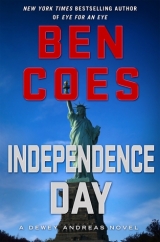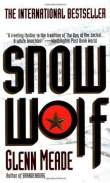
Текст книги "Independence Day "
Автор книги: Ben Coes
Жанры:
Боевики
,сообщить о нарушении
Текущая страница: 16 (всего у книги 28 страниц)
48
NEVA RIVER
SAINT PETERSBURG
Dewey treaded water and watched as lights in a marina building went on. A few seconds later, police cars poured in through a fenced-off entrance. Dewey dived beneath the surface and swam into the darkness, away from shore, resurfacing after more than a minute. Searchlights scanned the surface of the water near the shore. He turned onto his back and let the current take him away from the city.
The hum of the chopper’s rotors softened, blending into the slapping of the water. He floated for an hour as the lights of Saint Petersburg became a dome of dull yellow, blurry and silent, far in the distance. He came onshore along a rocky stretch of coast, bordered by a dense thicket of trees and brush.
He was exhausted. His knee was badly cut. He was cold and wet. He wanted to sit down and rest. But he couldn’t. Now was the time he needed to move. Not later, now.
They’re coming.
He took a step, then another, his eyes weaving between the starry sky and the tree line, moving east, navigating by the stars. He walked for at least an hour, through a rough country of trees and fields. Eventually, he came to the first sign of civilization: train tracks.
The rail bed had a few weeds, but he smelled fresh oil. The track was still being used.
Dewey moved left, along the tracks. He walked for another hour, then saw the outskirts of a rail yard. It sat quiet but was large. The tracks split into a dozen lines. Boxcars and locomotives filled the sidings.
Dewey’s clothing was still damp. He was hungry. Mostly, the gash at his knee hurt. But whatever discomfort he felt, he ignored. There would be time to think about it later. Right now, he needed to focus on a few core issues, survival being at the very top of the list.
He reached to his left calf. Sheathed to his leg was his Gerber combat blade, seven inches of black steel, double-serrated, its hilt wrapped in black hockey tape. He pulled it out, then moved along the outskirts of the big rail yard, at the edge of a tree line, to a simple two-story brick building at the side of the yard.
Dewey studied the building from the shadow of the trees. Seeing no activity, he charged across the exposed side of the building, reaching the far end, then crouching against the brick. He stalked, back pressed to brick, until he came to the corner of the building. Dewey peeked around. He saw a doorway and, beyond it a parking lot, empty except for a pair of pickup trucks.
Dewey walked to the door, jiggling the doorknob. It was locked. He glanced around, making sure he was alone, then heaved his shoulder against the door. It was a steel door. The lock was double-bolt. It wasn’t going to be opened by force.
“Fuck,” he muttered.
Dewey got down on his knees and felt along the foundation, looking for a hidden key. He went right, crawling all the way to the corner of the building. He found nothing.
A loud, creaking noise, then the slam of steel as, in the rail yard, on the other side of the building, there was activity; a boxcar was being moved.
Dewey repeated his search for a key on the far side of the door, crawling, banging the foundation. A few feet from the door, a piece of concrete seemed loose. Dewey tugged at it. It popped out. Behind it was a set of keys.
Back at the door, he inserted keys until one fit. He went inside, relocking the building behind him.
He felt the wall for light switches, then flipped them on. Clutching the knife in his right hand, Dewey moved inside the building.
He passed two offices, then came to a locker room, with work boots strewn against a far wall, benches, and lockers. He opened and closed lockers until he found one with clothing in it: a pair of jeans hanging from a hook and a dirty T-shirt. He held the jeans up, but they were far too small. He heard the door down the hallway open. Then voices, two men, speaking in Russian.
Dewey stepped quietly along the line of lockers. He wedged himself between the last locker and the wall.
One of the voices was coming closer. He couldn’t understand what the man was saying, but his tone was unmistakable. Anger. He heard doors opening down the hallway, then footsteps moving up the stairs to a second floor. The two men were calling back and forth to each other.
From the corner, Dewey watched the room through a small gap between the top of the locker and the ceiling. He saw the man’s shadow at first, then the man. He was big, dressed in a dark green uniform. Local police or railroad security.
Dewey stood as still as a statue. His eyes followed the man’s as he scanned the room, taking a drag on his cigarette, a small hint of grin appearing.
Dewey’s eyes shot to the bench. There, sitting on top of the bench, was the set of keys.
“Fuck,” he whispered. Don’t look at the keys.
The officer left the locker room and shut the door.
Dewey breathed a sigh of relief. He waited for the voices again. But there was nothing.
He should’ve searched the lockers.
Dewey understood in that moment that he’d seen the keys. He was getting the other officer.
Dewey scanned the locker room. There were two windows. Both were tiny.
The door was the room’s only entrance or exit.
Then the lights went off.
Dewey stepped out of the small hiding area. He had precious little time. He crawled to the pile of boots. There were several dozen pairs, piled against the wall. He dug out a crawl space beneath the pile. He covered every inch of his body and head in boots, still clutching the Gerber in his right hand.
Dewey waited for more than a minute. He heard the faintest scratching of metal, as the doorknob was slowly twisted open. He watched as the door opened. He saw the vaguest outline of a gun, moving in, then training right, at the space just inside the door along the wall, then the unmuted explosion of gunfire filled the room as the officer fired at the space next to the door in the same instant another man lurched inside, gun aimed in the other direction, and then, a second later, fired three blasts through the door; whatever was behind the door was now pelted with holes.
One of the men turned the lights on. Dewey watched through a tiny gap in the mass of boots that lay atop him. The two officers looked surprised at the empty corner, at the lack of a dead man just inside the door.
The second man was short and fat. He said something to the taller man.
Dewey guessed, from the shaking of the man’s head, that it was something along the lines of: Are you sure someone is in here?
The bigger guard stepped to the bench and picked up the keys, as if showing him proof.
Dewey’s ears suddenly picked up the faintest hint of a siren in the far-off distance.
The short man barked something in Russian. The other guard began to open the door to the first locker, near the door, at the opposite end of the room from Dewey. He looked inside the locker, found it empty, then slammed the door shut. He moved methodically down the line of lockers, opening and closing each one.
The siren grew louder, then was joined by more sirens.
They were coming. They were moving quickly, and they were organized. The Russian authorities were angry.
But how could they possibly know he was still in-country?
It didn’t matter. There was only one way he’d be able to get out of the rail yard, and it would necessarily leave evidence, likely in blood. In a few short moments, things would get hairy.
A splash of lights cut in through one of the windows.
The larger guard registered the arrival of additional policemen. He muttered something to the other guard, now standing in front of where Dewey lay, covered in a pile of boots.
Dewey watched as the two Russians argued, voices rising as they barked back and forth at each other. The shorter Russian was still clutching a pistol, which was aimed at the ground. His legs were less than a foot from Dewey. Through the man’s legs, Dewey could see the larger guard, who held a submachine gun, targeted unknowingly at Dewey’s head.
Dewey’s left arm pushed out through the boots—quietly, quickly—creeping through the air unnoticed. Dewey snatched the muzzle of the guard’s pistol with his left hand as, with his right, he reached for the guard’s hand. The guard felt the tugging, yelled, and looked down, eyes bulging, as Dewey clutched the gun, and now his hand. The guard yanked at the gun, trying to pull it away, as he screamed. The larger guard looked back at his partner, an expression of confusion on his face, until he saw Dewey’s hand on the muzzle. He waited an extra moment, then swung his submachine gun in their direction, while in the same instant Dewey inserted his right index finger into the trigger opening, over the guard’s finger, and lurched up, boots tumbling off him, overpowering the guard. Dewey swung the guard’s arm, and the pistol, across the room, firing, just as the other guard triggered the submachine, blasting rounds into the wall to Dewey’s right. The pistol’s unmuted gunshot was like an explosion. The slug tore into the big guard’s forehead, splattering blood behind him. He fell to the floor, on his back, as Dewey forced the small guard’s arm to the left. The guard screamed, gripping the butt of the Skyph with both hands. But Dewey overpowered him. He forced the pistol skyward, so that the muzzle was aimed at the guard’s chest, then pumped the trigger. The bullet tore into the center of the guard’s chest, dropping him.
Dewey climbed onto the bench, glancing at the parking lot through one of the windows. Three police cruisers, lights still on, were surrounded by a cloud of dust. Several policemen moved across the parking lot toward the building, weapons out.
He charged down the hallway and dead-bolted the main door. He moved back down the corridor to the locker room. Dewey took off his damp jeans, removed the big guard’s green uniform jacket and put it on, just as the first fist, knocking against the door, made a dull pounding noise down the hall.
Frantically, Dewey took off the man’s weapons belt, boots, and pants and pulled them on. The pounding of fists grew louder, followed by shouting in Russian. Dewey pulled his jeans onto the big guard, then buttoned them, as a sudden, very loud explosion boomed from the doorway. Dewey’s eyes shot up, watching the door as it rocketed inward, slamming into the wall across from the doorway.
Dewey took the pistol from the first guard and stuck it in the big man’s hand. He grabbed the submachine gun with his left hand, and, with his right, dipped his fingers in blood from the dead guard, wiping it across his own cheek and forehead.
Calmly, as the first drumbeat of boots echoed from down the hallway, Dewey lay down, his head arched slightly up. He trained the muzzle of the submachine gun on the dead guard, waiting.
To an observer, the scene was mayhem, the conclusion simple: a battle had taken place, and the guard, Dewey, now holding the gun, had prevailed by a whisker, killing the intruder, after the intruder somehow killed the other guard.
Dewey looked up, pretending to be dazed, registering the arrival of a small horde of officers. His eyes met one of them, who said something, but Dewey didn’t respond. Instead, he shut his eyes, lowering the submachine gun to the ground, and let his head fall back.
They carried Dewey to one of the police cruisers and lay him across the backseat. The door shut, then the car started to move.
The driver said something into the police radio, which was followed by a sharp squawking noise, then a female voice, probably a dispatcher, telling the driver where to go with the injured officer.
Dewey felt the weapons belt, removing a handgun. He opened his eyes just a crack, glancing to the front seat. There was only one officer, the driver.
Dewey sat up and swung the muzzle of the Skyph to the back of the driver’s head. The driver glanced in the rearview mirror, jerking back reflexively at the weapon held against his skull.
“Do you speak English?” asked Dewey.
The driver nodded.
“Yes,” he said in a coarse accent. “Little.”
“Keep driving,” said Dewey. “Do not pick up the radio. Do not adjust the lights. Keep your hands on the wheel. You understand?”
The police car was moving quickly. The daylight was rapidly turning the sky a light shade of blue.
“Tell me you understand.”
“Yes, I understand.”
“Who were you looking for?” Dewey asked. He already knew the answer, but some small part of him hoped perhaps he was wrong. He also wanted to find out how much they knew.
The driver glanced in the mirror, a look of confusion on his face.
“You,” said the policeman.
He nodded to his right. On the seat was a fake leather folder. Dewey leaned over the seat, keeping the gun against the driver’s head, and opened the folder. There on the inside was a sheet of paper. It was an all points bulletin. The top half was covered in Cyrillic writing. Dewey stared at the paper, then reached his arm down and lifted it up. Beneath it were two photos. One showed him. It had been taken at the Four Seasons, by security cameras, as he checked in. The other showed Katya Basaeyev.
Dewey pressed the gun hard against the driver’s neck, then held the sheet up.
“What does it say?” Dewey asked.
The driver glanced at the sheet, then looked at Dewey in the mirror.
“Multiple homicides,” he said. “As well the abduction of the ballerina.”
“Who put it out?” asked Dewey. “Saint Petersburg Metro?”
The driver glanced at the sheet.
“FSB,” he answered, referring to Russia’s notorious internal federal security force.
“Is it public yet?”
At this question, the officer turned, before Dewey placed the muzzle against his cheek and forced his head back around.
“You kidnapped someone famous. Your photo is everywhere.”
The officer reached to the radio and turned it on. A man was speaking Russian.
“I don’t speak Russian.”
“Well, it’s good for you that you don’t. He’s talking about you.”
“What’s he saying?”
“You’re wanted: dead or alive.”
49
BEST BUY
STERLING, VIRGINIA
Gant drove to an out-of-the way Best Buy store and purchased a new cell phone, paying for it with a Visa gift card bought under a fake name.
Back in the car, he rolled up his shirt sleeve. A phone number was written on his arm in ballpoint ink. He dialed the number.
“Hola,” came a soft female voice.
“Is he there?”
“No.”
“He needs to call me. It’s urgent.”
“Yes,” said the woman.
Gant read her the number for the new phone.
“Tell him it’s extremely important.”
Gant hung up. He glanced around the parking lot, then took out a pack of wipes from the glove compartment. He wiped the number from his arm, buttoned his shirt, then sped quickly out of the parking lot.
50
ABOARD THE LONELY FISHERMAN
INTERNATIONAL WATERS
Dawn was at least an hour away as Poldark trudged along the dank, musty corridor belowdecks. At the cargo hold where the bomb was, he slowly pulled on the hazmat suit.
Each time, the suit took longer and longer to get on, most likely because, despite the self-contained breathing apparatus, radiation from the bomb was getting through. But those small doses were about to become a thing of the past. Today, exposure for him and anyone else on the boat would escalate dramatically. Today marked the beginning of the end for him and the crew.
He opened the steel door, stepped inside, then shut the door tightly behind him.
All extraneous pieces of the original bomb had been removed. What remained was on the stainless steel table. It looked like a giant soup can, four feet long, two feet in diameter. Thick, dark, reddish-green steel. A seam at one end of the cylinder. The other end smooth and rounded and slightly bulbous.
Poldark went to a large red duffel bag against the wall. He opened it and removed a black case. Inside was a set of instruments. After measuring the circumference of the end piece, Poldark attached a series of specialized clamps, then attached a wire to the clamps. This enabled Poldark to pinpoint the precise apex of the seam between the end of the cylinder and the barrel. Once that was done, he removed what looked like a pencil from the case. Placing it at the seam, he hit a small switch, producing a soft hum as a tiny, nearly invisible diamond-tungsten cutting device moved rapidly up and down, etching a minuscule cut into the steel.
It took Poldark six hours to penetrate the seam at the end of the barrel. It took him eight more hours to complete the cut in a manner that would not unintentionally set off the trigger.
Other than bathroom breaks, he didn’t leave the room.
Sometime after eight at night, Poldark left the bomb and went back upstairs. He went directly to his bedroom and climbed into bed. He was so tired that he forgot to remove his suit as well as the breathing unit covering his head.
51
OVAL OFFICE
THE WHITE HOUSE
John Schmidt, the president’s communications director, stepped into the Oval Office. Already gathered were President Dellenbaugh, National Security Advisor Josh Brubaker, and Vice President Daniel Donato.
“Sorry I’m late.”
The mood was tense. Schmidt had called the meeting to discuss a subject that made all of them uncomfortable.
“We have to get the fact that a nuclear bomb is on its way to the United States out there,” said Schmidt, standing just inside the doorway. “It’s going to get out there, so we might as well be in front of it.”
“I disagree,” said Brubaker. “The level of panic that would be created would not only be hard to manage, it would hinder our effort to find the bomb.”
“Josh,” said Schmidt, shaking his head in impatience, “how many times have we had this debate on any number of topics? It’s going to leak. There are too many people at too many agencies, not to mention the terrorist himself.”
The door behind Schmidt abruptly opened. Schmidt’s deputy, Gary Foster, poked his head in.
“They’re breaking the story about Katya Basaeyev,” he said. “I thought you’d want to know.”
“Who’s got it?”
“BBC.”
Schmidt opened up what looked like a bookcase. Behind it were six flat-screen plasmas. He took the remote and switched on the BBC.
A female correspondent was on a bridge in Moscow, the lights of the city behind her.
* * *
“This is Sarah Rainsford, reporting to you live from Moscow, where a series of incidents tonight have the country rattled and Russian authorities on high alert…”
* * *
The television cut to an aerial video taken from a news helicopter showing flames coming from a building.
* * *
“What you are looking at is live video from Rublevka, an exclusive Moscow suburb, where, according to several eyewitnesses, a loud explosion occurred just a few hours ago. As you can see, the inferno is still burning as firefighters try to stop the flames from spreading to nearby dachas…”
* * *
The TV cut to live video from Saint Petersburg, where a swarm of police lights flashed on a locked-down street near the Four Seasons Lion Palace.
* * *
“In addition, in the city of Saint Petersburg, just a few hours from here, an intense manhunt is under way after the apparent abduction of one of Russia’s most famous citizens, the ballerina Katya Basaeyev, taken, according to one source, from her hotel room following a performance at the Kirov Ballet. This photograph, taken by a hotel security camera, shows an unidentified man whom the FSB called its main suspect in the abduction…”
* * *
A black-and-white photo of Dewey flashed to the television screen.
Schmidt muted it.
“The story is going to get closer and closer,” he said emphatically.
“We can’t let any aspect of the bomb get out,” said Brubaker, almost yelling. “The American public would panic—”
“You don’t get it, do you?” interrupted Schmidt, shaking his head and taking a step toward Brubaker, then pointing. “It’s not the White House versus America, Josh. It’s America versus the terrorists. We need the public’s help. We need their support. If you lie about stuff like this, you’ll lose them. They’ll blame us for not being up front, and by ‘us’ I mean the president.”
Schmidt turned to leave.
“Mr. President,” said Brubaker, looking at Dellenbaugh. “You need to make the call.”
Dellenbaugh nodded at Schmidt.
“I understand your argument, John,” said Dellenbaugh, “but Josh is right. If America finds out a nuclear device is on its way to our country, there will be widespread chaos. We can’t stop the terrorist and deal with that at the same time. For now, this stays close to the vest.”








